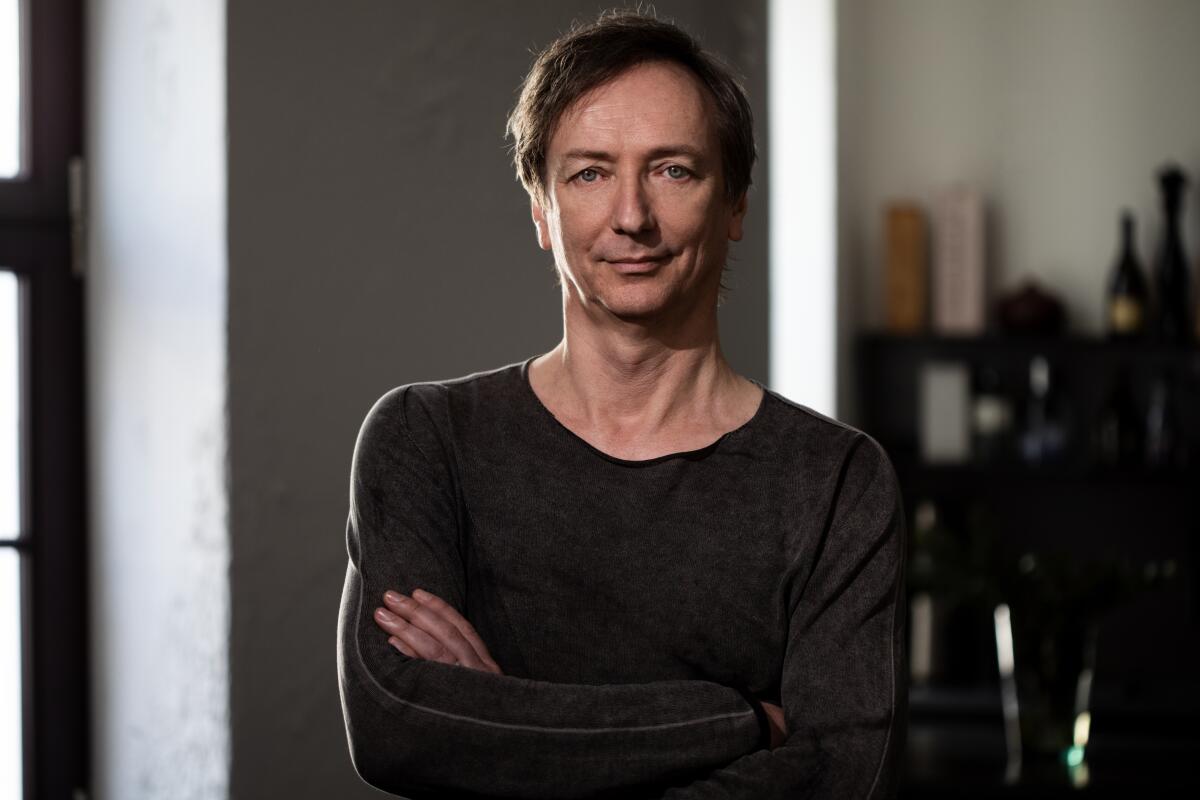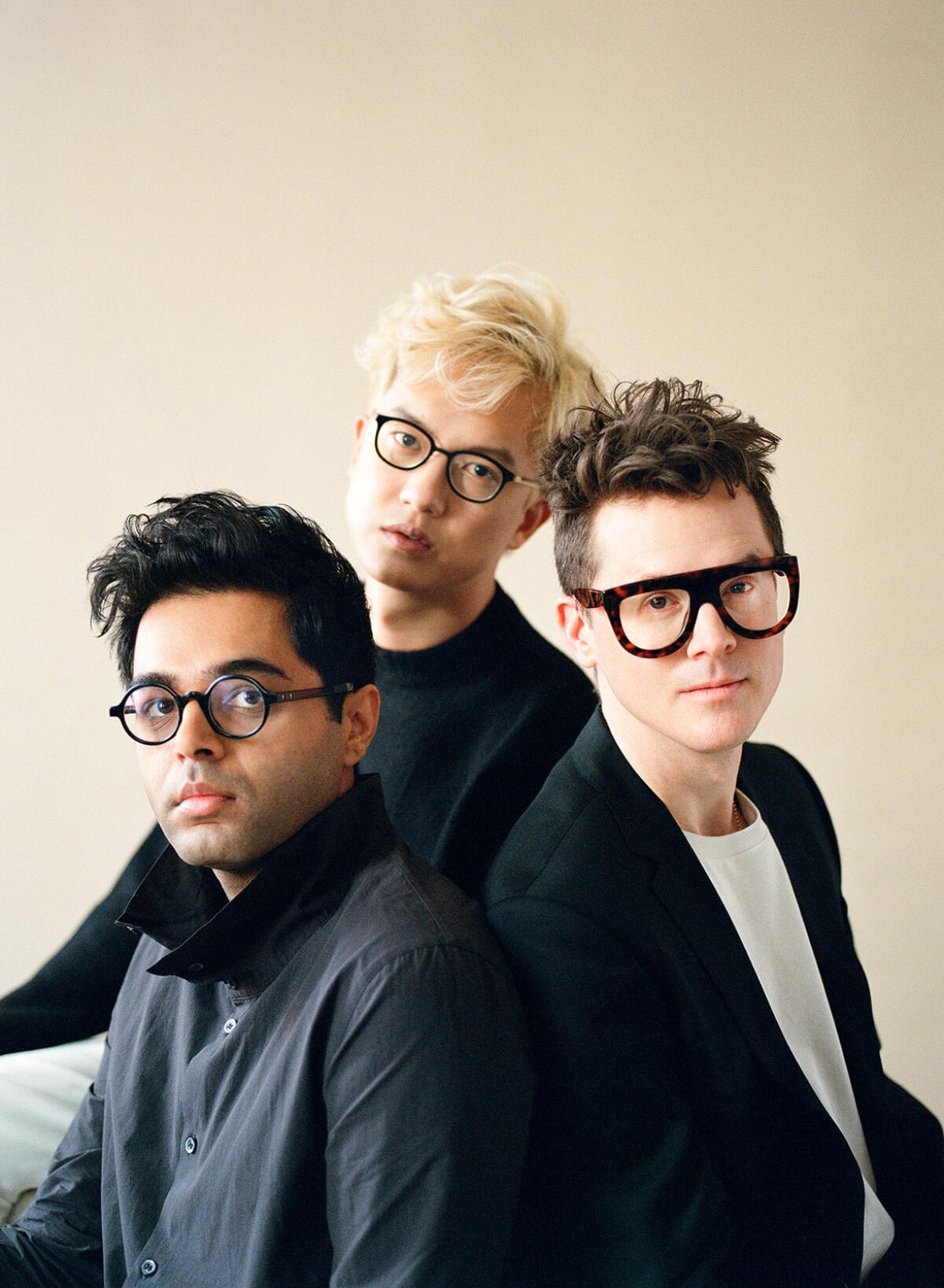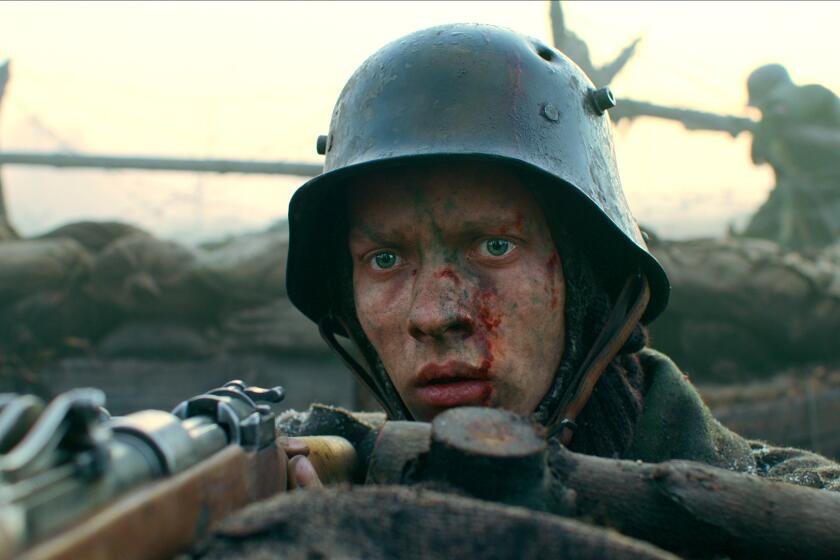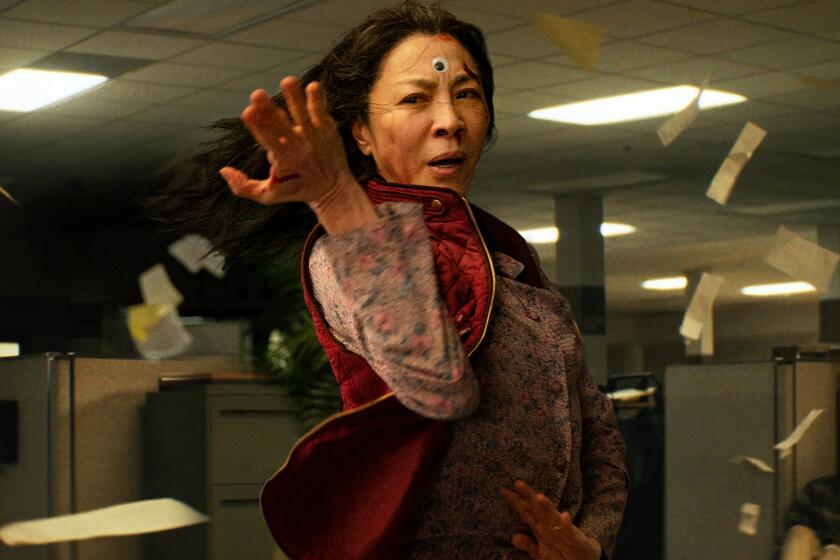Two wildly different scores similarly challenge their composers

- Share via
From the grimmest battlefield to the most stressful laundromat ever, two of the big surprises in this year’s nominees for original score are German composer Volker Bertelmann and the band Son Lux. Their scores are wildly different — as are their respective films — but both challenged the composers to go beyond what they had ever done.

Volker Bertelmann
“All Quiet on the Western Front”
When Bertelmann first watched “All Quiet on the Western Front” in Berlin, director Edward Berger gave him four directives: “I want to have destruction. I want to have the feeling of Paul Bäumer’s stomach. I want to have disruptive snares that are played by somebody who can’t play snares. And I want from you something that you’ve never done before.”
Inspired by those very specific yet wide-open parameters, the composer went home — he lives on the western front of Germany — and came up with a three-note theme for the relentless machinery of war. He played it on a harmonium, which is a pump organ, and used microphones to capture the breaths and crackling inside the instrument — treating it with amplification and distortion to make it sound almost like a modular synthesizer.
The film used letters from those at war -- and their metaphorical descriptions of the sounds -- to be aurally authentic yet not pinned to “scientific” accuracy.
He sent the track to Berger, “who was straightaway saying, ‘Oh, man, we have such a blast here on our hi-fi speakers — it sounds like a Led Zeppelin song. We’re impressed!’” Bertelmann replied: “OK, I’m very glad, because if you said no I would have had a problem.”
Those notes sear over the opening images of German soldiers being mowed down in waves, their bodies stacked and stripped, their uniforms washed and repaired and then given to new waves of young men who have no idea what horrors await them on the front line. Based on the famous 1929 novel by a German veteran, the film is a persistently bleak but poetic tour of the gradual dehumanization of a teenage soldier, Paul Bäumer (Felix Kammerer), during the brutal last days of World War I.
Bertelmann tried to convey the humanity leaving Bäumer, as well as the beauties of home that haunt his doomed corps. A skittering violin arpeggio accompanies the arc of a flare in the night sky; a battle is anticipated with an irregular staccato heartbeat, another with rumbling percussive effects produced by a deep contrabass; a string adagio adds to the poignancy of men bonding and laughing over the meal of a stolen goose.
Telling this story from the German side, the composer was careful to avoid heroics — and even tears. “That’s a very thin line,” he says. “You just need one chord more, and suddenly the tears are pouring out of you.”
That doesn’t keep audiences from crying, of course. “Me too,” says Bertelmann, “when I was doing it — but it was much more, because it hurts.”

Son Lux
“Everything Everywhere All at Once”
Directors Daniel Kwan and Daniel Scheinert were fans of experimental rock band Son Lux when they approached the group to score their intensely idiosyncratic movie about a Chinese-born American mom who channels her various selves across multiple universes to fight off existential malaise and restore relationships with her family.
“They knew this was a multiverse band,” says Ryan Lott, founding member of Son Lux, “so they knew that they could get out of us, individually, things that were very specific.” Adds bandmate Rafiq Bhatia: “They knew we could reconcile, even if we leaned hard into our individual inclinations — because that’s what we do ultimately when we make music together.”
Daniels, the directors of ‘Everything Everywhere All at Once,’ reveal the inspirations behind the wildest ideas in their maximalist action movie.
The resulting score is a kaleidoscope of kung-fu action music, futuristic sci-fi, Chinese opera, “Claire de Lune” as played by toes — and, at its heart, a tender piano ballad for a mother and her daughter. The Daniels wanted the score to feel like it was flipping channels — i.e., different universes — “and have them feel completely uncorrelated,” says Bhatia, and then “the music can help us bring all of these disparate worlds together in a way that has emotional weight.”
Inside the eye of a storm that includes humans with hot dog fingers and homages to “The Matrix” — embodied by a playful and fully committed chaos and humor in the score — there is a vulnerability and soft kindness in the music that has a tactile, delicate quality.
“The feat of this movie is not its relentless craziness and absurdity,” says Lott, who also co-wrote the film’s Oscar-nominated song, “This Is a Life,” with David Byrne and Mitski. “It’s that all of that is somehow working at the behest of something deeply human, emotional and moving.”
Fittingly, the trio, which includes Ian Chang, worked on the music everywhere all at once — separated geographically during the pandemic lockdown. It helped that they had been making music together for almost a decade and shared a musical language.
Another reason it all synchronized in the end is that, “despite how disparate the genres might be,” Chang says, “the music is really in a dance with the actors on the screen, as well as the sound design. The Daniels are very interested in having things be tightly scored and hitting moments on-screen, which is definitely a stylistic choice. They’re very down for it to feel like it’s all in cadence with one another — to a pretty extreme degree.”
More to Read
From the Oscars to the Emmys.
Get the Envelope newsletter for exclusive awards season coverage, behind-the-scenes stories from the Envelope podcast and columnist Glenn Whipp’s must-read analysis.
You may occasionally receive promotional content from the Los Angeles Times.








